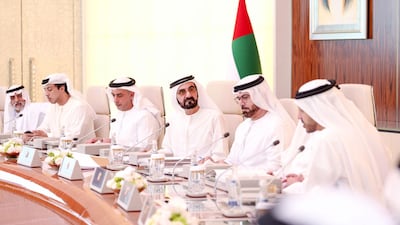Companies and residents on Tuesday welcomed the UAE Cabinet's announcement of business activities eligible for up to 100 per cent foreign ownership under a law ratified last November, as the country seeks to increase investment from overseas and create jobs for nationals.
The list of 122 economic activities across 13 sectors includes renewable energy, space, agriculture, manufacturing, transport, logistics, hospitality, food services, information and communications, and a host of others, according to the UAE state news agency Wam.
"Our goal is to open and expand economic sectors, attract new investors and cement the global competitiveness of our national economy," Sheikh Mohammed bin Rashid, Prime Minister of the UAE and Ruler of Dubai, wrote on Twitter on Tuesday.
"Local governments [across the seven emirates of the UAE] will determine the percentage of ownership in each activity according to their circumstances," he added in the tweet. In certain emirates, some activities could still require an Emirati shareholder, even if the foreign ownership threshold increases.
Previously, foreign investors could hold up to 49 per cent of a company registered in the UAE, unless it was in a designated free trade zone, and would have to partner with an Emirati investor who would hold the remaining 51 per cent.
Like other GCC countries, which have traditionally relied upon hydrocarbons to empower their economies, the UAE has implemented reforms to strengthen and diversify amid a period of lower oil prices. Reforms include lowering business registration fees to grow the non-oil private sector and introducing a 5 per cent VAT in January last year, under a GCC-wide agreement.
The Emirates has also started issuing long-term residency visas to few expatriates to encourage them to stay longer and invest in the country. Special "gold card" permanent visas have been granted to expatriates who have contributed substantially to the UAE economy.
The International Monetary Fund in April projected the state's gross domestic product growth to rise to 2.8 per cent this year, up from 1.7 per cent in 2018. Increased construction activity in the run-up to Expo 2020 in Dubai is also set to spur growth.
Relaxing foreign ownership rules "is a further measure to liberalise and strengthen the investment environment and will be a critical step in the development of new sectors and industries", said Monica Malik, chief economist at Abu Dhabi Commercial Bank. "A key objective will likely be areas linked to technologies and ones that will support job creation."
The inclusion of logistics and storage activities in the list will "allow investors to own projects in e-commerce transport, supply chain, logistics and cold storage for pharmaceutical products", the Wam reported.
Professional, scientific and technical activities are also eligible – “which enables ownership of laboratories for research and development in biotechnology”.
The list also includes administrative services, support services, educational activities, health care, arts and entertainment and construction.
In November, when the law was published in the UAE’s Official Gazette, the government announced around a dozen sectors that would not qualify for 100 per cent foreign ownership. Under these are oil and gas, banking, utilities, road and air transport, telecoms and medical retail (including pharmacies).
Despite the exclusion, the founding chairman and managing director of one of UAE's biggest pharmacy chains, Aster DM Healthcare, said opening up other industries to foreign investment would bring substantial benefits to the country.
“This fantastic move will facilitate more investment by the expat community in the UAE and, more importantly, will encourage many more investors to bring fresh capital into the country,” Dr Azad Moopen said.
Paras Shahdadpuri, chairman of UAE conglomerate the Nikai Group of Companies, added: “This has been a longstanding demand of the business community, which felt strongly [about the fact] that when they have invested 100 per cent foreign equity and manage the entire business, they still needed to follow the rule of 49:51 ownership."
The UAE has continued to go up in the World Bank’s Ease of Doing Business ranking and stands at number 11 among 190 economies, said Abhishek Sharma, founder and chief executive of alternative investor Foundation Holding in Dubai.
“This decision will reiterate the UAE’s position as a haven in the investment community,” he said.

